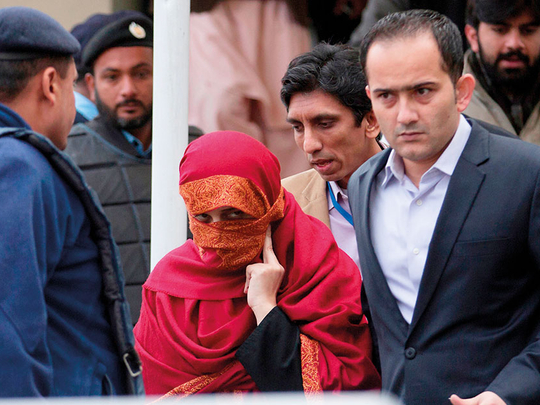
Islamabad: The Islamabad High Court Tuesday sentenced a former additional district and sessions judge and his wife to a year in prison in the child maid torture case, which sparked a public outcry December 2016.
The court also imposed a Rs50,000 (Dh1,585) fine on Raja Khurram Ali Khan and wife Maheen Zafar. They were arrested after the verdict was given.
The couple were charged with assaulting, confining, ill-treating, abandoning and harming the minor. They were sentenced for their involvement in keeping the then 10-year-old Tayyaba in wrongful confinement, burning her hand over a missing broom, beating her and detaining her in a storeroom, and threatening her with “dire consequences”.
The couple had pleaded not guilty. Khan said he will challenge the verdict in the Supreme Court and filed a bail plea, which was approved. The bail would be valid for seven days, court ruled.
Statements of 19 prosecution witnesses were recorded, including that of Tayyaba’s parents.
The case of Tayyaba first came to light after photos of the tortured child began circulating on social media.
On December 29, 2016, Tayyaba, then a 10-year-old, was recovered from the house after complaints of torture from neighbours and a first information report was filed against her employers.
Khan reached a compromise with Tayyaba’s parents on January 2, 2017, and a day later the child was handed over to them. On January 4, however, the Supreme Court took a suo motu notice of the matter, saying: “No agreements can be reached in matters concerning fundamental human rights.”
Although the minor’s face and hands bore marks of torture, she was so scared that she initially denied being hurt by her employers. However, later the child told a woman magistrate that she was beaten and her hand burnt on the stove for losing the broom. A medical board, formed to ascertain the facts in the torture case, in its report said there were torture marks on the girl’s body.
Activists believe the sentence of Tayyaba’s employers serves as a ray of hope for the future of children especially domestic workers.
“Pakistan’s courts have set the right precedent by sentencing a judge and proving that no one is above law,” Samia Shah, a child activist, said.
Fiaz Mahmood, a journalist covering the case, said the sentence “will deter people from hiring children as domestic workers and will offer some respite to child workers who are deprived of their basic rights to education and even life.”












